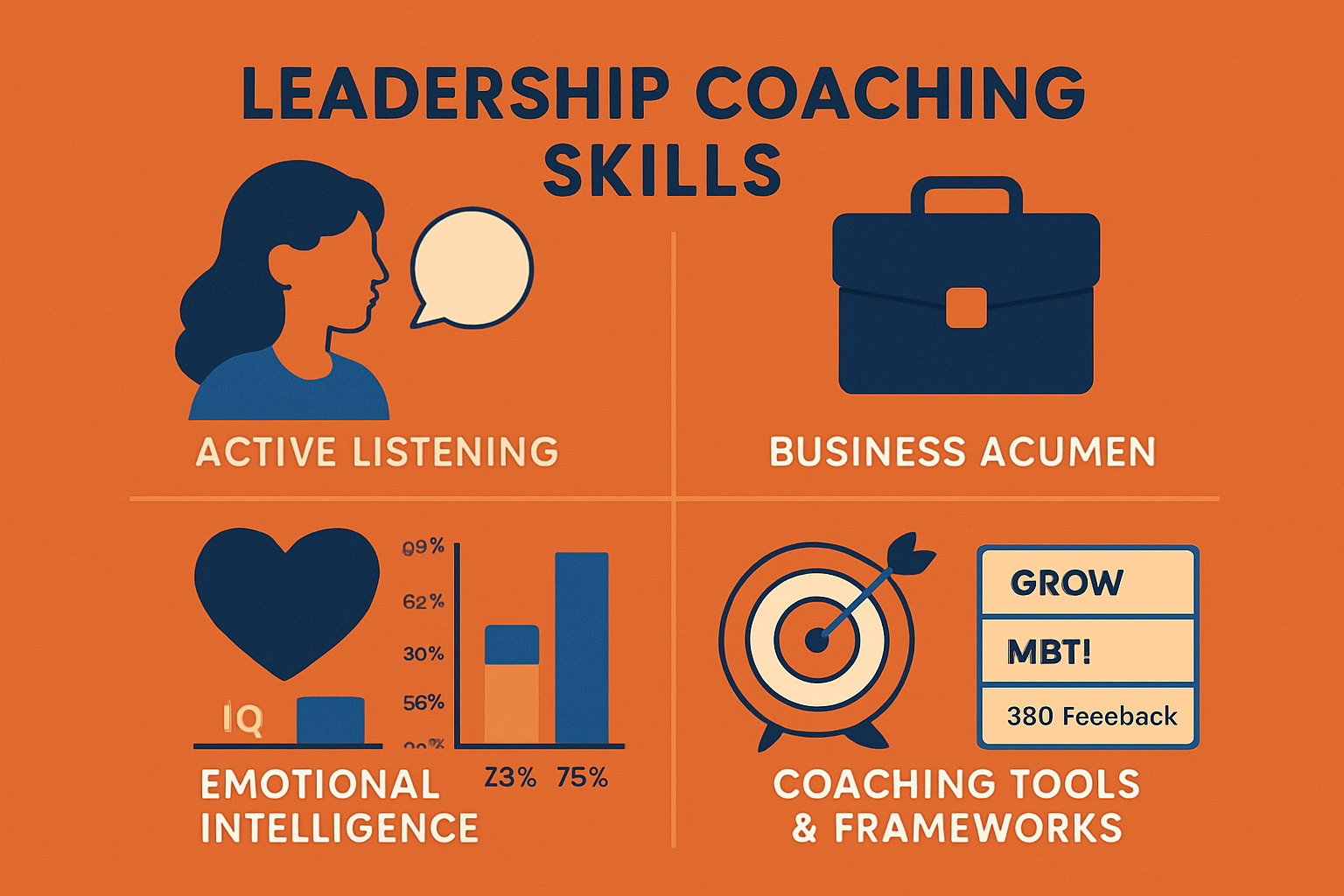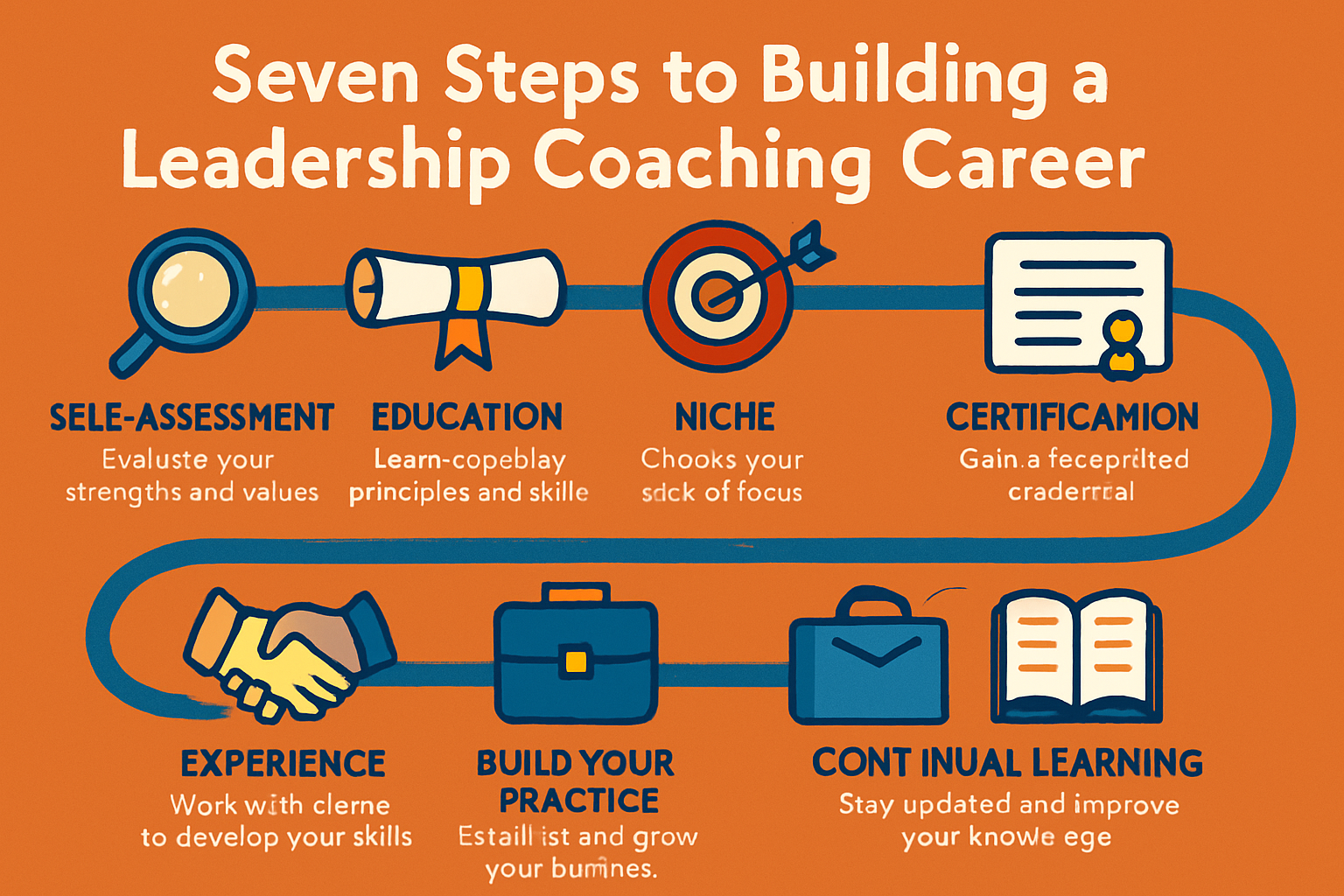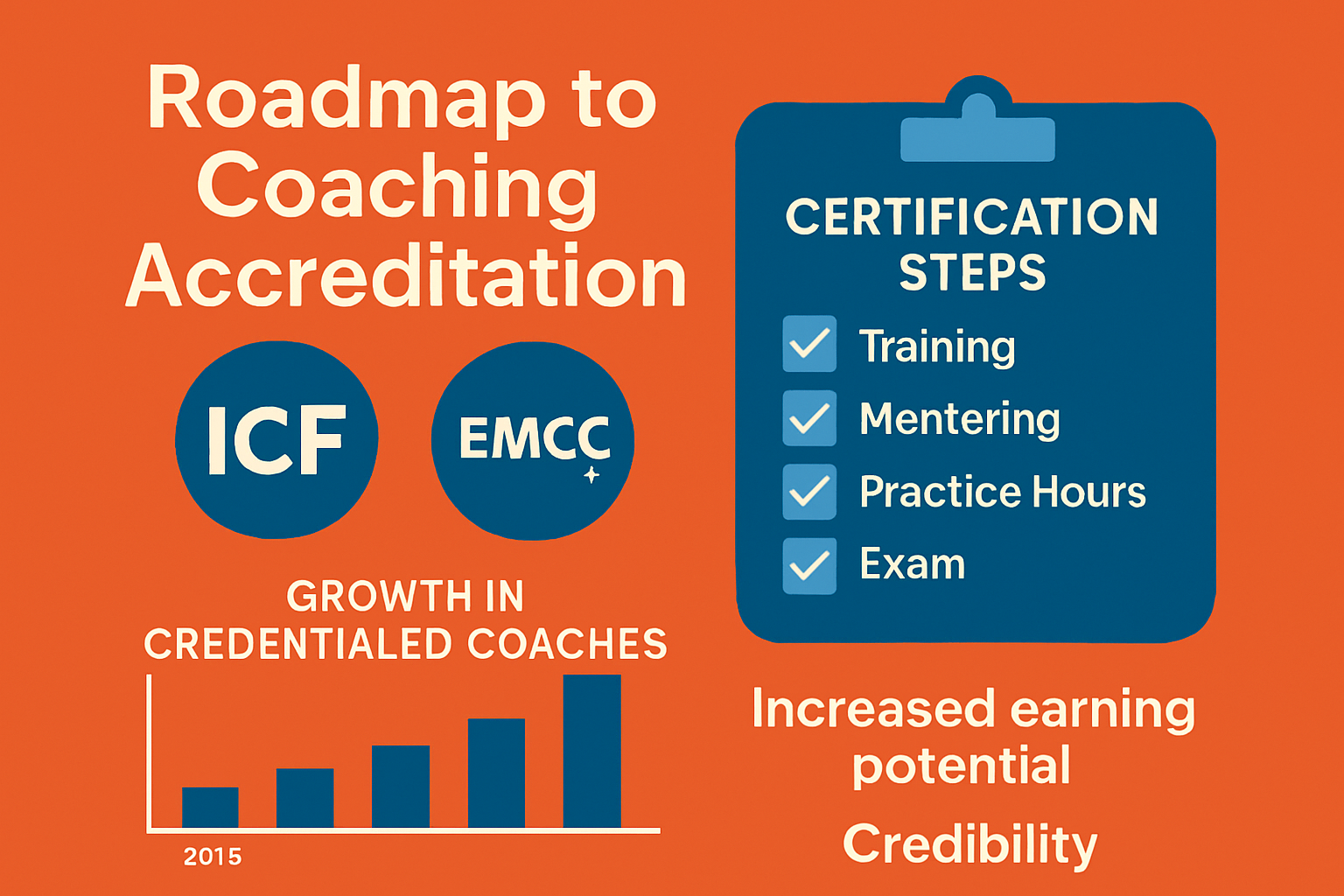Posted on August 17, 2025 by Don Markland
Imagine being the catalyst who empowers others to lead with confidence and vision. Leadership coaching careers are among the fastest-growing and most rewarding paths in 2025. This guide unpacks everything you need to know, from essential skills and certifications to real-world trends and actionable steps. Discover why organizations are investing in coaching, how you can build a thriving practice, and what the future holds for those ready to make an impact. Ready to unlock your potential and help others do the same? Let’s dive in.What is Leadership Coaching?
Imagine a profession where your daily work empowers leaders to grow, change, and influence positive results. That’s the promise of leadership coaching careers, a field centered on helping individuals unlock their potential and drive organizational success. Let’s explore what makes this role unique and how it’s changing the world of work.Defining Leadership Coaching
Leadership coaching is a specialized form of professional coaching focused on helping leaders increase self-awareness, improve performance, and develop interpersonal skills. Unlike life or career coaching, it zeroes in on supporting people in positions of influence—executives, managers, and team leads—navigating complex workplace challenges. Typical leadership coaching careers involve guiding clients through situations like conflict resolution or strategic planning. For example, a manager might seek coaching to handle team disagreements or to boost decision-making skills. The ultimate outcomes? Higher employee engagement, better productivity, and greater retention rates across organizations.The Evolution of Leadership Coaching
Since the early 2000s, leadership coaching careers have evolved rapidly. The field has shifted from directive advice-giving toward a more facilitative, partnership-based approach. This change reflects broader trends: globalization, digital transformation, and the rise of remote work have made adaptable leadership more essential than ever. According to executive coaching industry growth statistics, the demand for coaching has surged, with the industry growing by 54% in the past decade. Today, leadership coaching is integrated not just in Fortune 500 companies, but also in startups and business schools, confirming its staying power.Why Organizations Invest in Leadership Coaching
Organizations turn to leadership coaching careers for a strong return on investment. A recent Korn Ferry study found that 88% of companies report positive ROI from coaching programs. The benefits go beyond numbers: companies see stronger leadership pipelines, healthier workplace cultures, and more innovation. For instance, many Fortune 500 firms now embed coaching into their talent development strategies, helping leaders at all levels grow and adapt. This results in more agile organizations that can respond quickly to change.Types of Leadership Coaching
Leadership coaching careers can take many forms, each with its own approach and outcomes:- Executive coaching: One-on-one work with senior leaders to tackle strategic goals.
- Team coaching: Facilitating group dynamics and cross-functional collaboration.
- Group coaching: Peer-based learning and shared leadership challenges.
- Emerging leader coaching: Supporting new managers as they step into leadership roles.
| Coaching Type | Typical Client | Focus Areas |
|---|---|---|
| Executive | C-suite, VPs | Strategy, influence |
| Team | Project teams | Collaboration, goals |
| Group | Peer groups | Shared learning |
| Emerging Leader | New managers/leads | Transition, confidence |
Who Becomes a Leadership Coach?
People in leadership coaching careers often come from backgrounds in HR, business, psychology, or education. What unites them is a passion for helping others grow. Key attributes include empathy, active listening, and a growth mindset. If you’re drawn to guiding others, enjoy complex problem-solving, and believe in lifelong learning, leadership coaching careers could be your perfect fit.Essential Skills and Competencies for Leadership Coaches
Stepping into leadership coaching careers means developing a blend of interpersonal, business, and assessment skills. Successful coaches combine heart, strategy, and self-awareness to guide leaders toward growth. Let’s break down the essential competencies for thriving in this rewarding field.
Core Coaching Skills
At the foundation of leadership coaching careers are core coaching skills. These include active listening, powerful questioning, and structured goal setting. Coaches must build trust and rapport with clients, creating a safe space for open dialogue. For example, the GROW model (Goal, Reality, Options, Will) provides a simple yet effective structure for sessions. This model helps leaders clarify what they want to achieve, explore challenges, and commit to action. By consistently applying these skills, coaches support leaders in reaching their full potential.Business Acumen and Industry Knowledge
Leadership coaching careers also demand strong business acumen. Coaches need to understand organizational dynamics, industry trends, and business strategy. This knowledge enables them to contextualize coaching conversations and offer relevant guidance. Consider a coach helping a leader navigate digital transformation. Understanding sector-specific challenges—like remote work or rapid tech adoption—ensures coaching is practical and actionable. Coaches who stay updated on industry shifts provide more value to their clients and organizations.Emotional Intelligence and Self-Awareness
Emotional intelligence (EQ) is a cornerstone of effective leadership coaching careers. High EQ allows coaches to build deeper relationships, empathize, and manage their own emotions during sessions. Techniques such as self-reflection and mindfulness help coaches recognize and set aside personal biases. Research from Harvard Business Review highlights EQ as a top predictor of coaching success. When coaches model emotional awareness, they inspire leaders to develop similar skills, which improves communication, engagement, and team morale.Tools, Frameworks, and Assessments
Modern leadership coaching careers benefit from a range of tools and assessments. Familiarity with 360-degree feedback, MBTI, DISC, and StrengthsFinder allows coaches to tailor development plans to each client’s needs. Selecting and interpreting these assessments is key to measuring progress and demonstrating growth. To align with industry standards, many coaches consult the ICF coaching certification requirements to ensure their skills and tools meet professional benchmarks. Using the right frameworks not only supports clients’ journeys but also strengthens a coach’s reputation and results.Step-by-Step Roadmap to Building a Leadership Coaching Career
Embarking on leadership coaching careers can feel overwhelming, but breaking it down into clear, actionable steps brings clarity and confidence. Whether you’re transitioning from another profession or starting fresh, this roadmap guides you from self-discovery to ongoing growth in the coaching world.
Step 1: Assess Your Fit and Motivation
The journey toward leadership coaching careers begins with honest self-reflection. Ask yourself: Why do I want to help leaders grow? What skills and experiences can I bring forward? Consider your background—whether it’s HR, education, business, or psychology—and identify transferable strengths like empathy, clear communication, and a growth mindset. For example, an HR manager may already excel at conflict resolution and team development, both valuable in coaching. List your motivators and aspirations. Are you drawn by a desire to empower others or to create positive change in organizations? Understanding your core “why” ensures your path into leadership coaching careers is both purposeful and sustainable.Step 2: Obtain Relevant Education and Training
Solid educational foundations are essential for successful leadership coaching careers. Start by exploring coaching-specific programs, which can range from university courses to specialized certificates and workshops. Look for programs accredited by reputable bodies such as the International Coaching Federation (ICF) or the European Mentoring and Coaching Council (EMCC). These programs typically include coursework in coaching theory, ethics, and practical skills. Consider time and financial investment—some certificates can be completed in a few months, while advanced degrees may take longer. Many aspiring coaches begin with shorter workshops before committing to more intensive programs. This approach helps you sample different methodologies and decide what resonates most for your leadership coaching careers.Step 3: Choose a Niche and Target Market
Specialization is a powerful way to stand out in leadership coaching careers. Reflect on your interests and experience to identify a target group—such as tech leaders, healthcare professionals, or emerging managers. Research market demand and competition. Are there underserved populations or industries where your background gives you a unique advantage? For example, coaching women in leadership roles or supporting leaders in educational settings. Selecting a niche allows you to tailor your messaging, develop specialized programs, and become known for your expertise. This focus is key to building authority and sustainability in leadership coaching careers.Step 4: Earn Professional Certification
Professional credentials are increasingly important in leadership coaching careers. Credentials like ICF Associate Certified Coach (ACC), Professional Certified Coach (PCC), or Master Certified Coach (MCC), as well as EMCC certifications, set you apart. Each credential has specific requirements, such as training hours, supervised coaching, and passing an exam. According to a recent ICF Global Study, 85% of clients prefer certified coaches, highlighting the value of accreditation. Use a table to compare popular certifications:| Credential | Training Hours | Coaching Experience | Exam Required |
|---|---|---|---|
| ICF ACC | 60+ | 100+ hours | Yes |
| ICF PCC | 125+ | 500+ hours | Yes |
| EMCC Practitioner | 100+ | 36+ hours | Yes |
Step 5: Gain Practical Experience
Hands-on experience is crucial for growth in leadership coaching careers. Start by offering pro bono sessions, peer coaching, or internal coaching within your organization. Request feedback and testimonials from each client. Keep a detailed coaching log, as most certification bodies require documentation of hours and outcomes. Real-world practice helps refine your style, develop your confidence, and build a portfolio of success stories. Each coaching interaction adds depth to your leadership coaching careers journey.Step 6: Build Your Coaching Practice
Once you’ve gained foundational skills, it’s time to establish your own practice. Decide on your business structure, secure insurance, and prepare contracts. Build a simple website, create a clear brand, and network both online and in your local community. Embrace digital tools for scheduling and payments to streamline your workflow. Marketing can be as simple as sharing your journey on social media or offering free workshops. Remember, the Global coaching industry market size is expanding rapidly, so opportunities for growth in leadership coaching careers are abundant.Step 7: Continual Learning and Supervision
Lifelong learning is the hallmark of sustainable leadership coaching careers. Join professional associations, attend workshops, and seek out supervision or mentoring relationships. Participate in mastermind groups or peer coaching circles to sharpen skills and stay inspired. The coaching industry evolves quickly, so staying connected to new research, tools, and ethical practices ensures you remain effective and credible in your field. Continual growth keeps your leadership coaching careers fresh, relevant, and deeply rewarding.Navigating Certification and Accreditation in 2025
Navigating the world of certification is a pivotal step for anyone considering leadership coaching careers. With evolving industry standards and growing demand for credible coaches, understanding your options in 2025 will set you apart.
The Coaching Credential Landscape
In leadership coaching careers, certification bodies like the International Coaching Federation (ICF) and European Mentoring and Coaching Council (EMCC) set global standards. These organizations offer structured pathways, each with unique requirements and recognition. ICF is widely recognized in North America and globally, while EMCC holds strong influence in Europe. Trends in 2025 show a shift toward evidence-based coaching. More organizations want proof of skill and measurable outcomes. Choosing an accredited path not only validates your expertise but also opens doors to diverse leadership coaching careers worldwide.| Accrediting Body | Region | Focus | Recognition Level |
|---|---|---|---|
| ICF | Global | Competency-based | High (corporate/global) |
| EMCC | Europe | Evidence-based | High (Europe) |
How to Choose the Right Certification Path
Selecting the best accreditation for leadership coaching careers depends on your goals, client base, and market. For example, if you plan to coach in Europe, EMCC may offer better alignment with local standards. The ICF, however, is highly valued by multinational companies. Compare requirements for ICF’s ACC, PCC, and MCC credentials—each demands increasing levels of training, mentoring, and client hours. Consider your long-term vision: Do you want to work with executives, team leaders, or emerging talent? Matching your certification to your target audience ensures your credentials truly support your leadership coaching careers.The Certification Process Explained
The process for most leadership coaching careers includes several key steps:- Complete an accredited training program (often 60–200+ hours)
- Log a set number of coaching hours (from 100 to 2,500, depending on level)
- Receive mentor coaching and pass an assessment or exam
The Value of Accreditation for Career Growth
Accreditation is a game-changer for leadership coaching careers. Certified coaches enjoy greater trust, access to higher-paying clients, and more opportunities with corporate contracts. In fact, ICF data shows accredited coaches earn 20–40% more on average. Organizations increasingly seek proof of coaching ROI. For a deeper look at how executive coaching delivers measurable results, check out executive coaching effectiveness and ROI. Earning your credentials not only boosts your confidence but also signals your commitment to excellence in leadership coaching careers.Income Potential, Career Paths, and Industry Trends
Curious what the future holds for leadership coaching careers? Let’s break down the earning potential, career options, and emerging trends shaping this vibrant field in 2025.Leadership Coaching Compensation in 2025
Leadership coaching careers offer strong income potential. In 2025, average hourly rates typically range from $150 to $500 or more, depending on your niche and experience. Factors like your location, whether you work with corporate or private clients, and your area of specialization all influence your rates. Here’s a quick summary:| Experience Level | Hourly Rate | Typical Client |
|---|---|---|
| Entry-Level | $150–$250 | Startups, individuals |
| Mid-Level | $250–$400 | SMBs, team leaders |
| Senior/Expert | $400–$500+ | Executives, Fortune 500 |
Career Pathways: Employment vs. Entrepreneurship
There are multiple ways to shape your journey in leadership coaching careers. Some professionals work as in-house coaches within large organizations, enjoying a steady salary and benefits. Others launch an independent practice, setting their own hours and client base. Each path has its advantages:- In-house employment: Security, structured career growth, access to corporate resources.
- Entrepreneurship: Flexibility, autonomy, and the potential for higher earnings.
- Hybrid models: Combine consulting and coaching for a diversified practice.
Expanding Your Services and Impact
Leadership coaching careers can go far beyond one-on-one sessions. Coaches are increasingly expanding their offerings to reach wider audiences and boost revenue. Consider these options:- Group coaching for teams
- Facilitated workshops and leadership retreats
- Online courses and self-paced programs
- Corporate partnerships for ongoing development
Industry Trends and Future Outlook
The landscape for leadership coaching careers is rapidly evolving. Technology, especially AI-enabled coaching platforms, is transforming how coaches interact with clients and track progress. There’s a growing focus on diversity, equity, and inclusion (DEI), as organizations seek culturally competent coaches. Remote and hybrid coaching remains in high demand post-pandemic. According to the ICF Global Coaching Study, digital transformation is a key growth driver for leadership coaching careers worldwide. Staying informed about these trends ensures your coaching practice remains relevant and impactful.Challenges and Opportunities Ahead
Like any field, leadership coaching careers come with challenges. The market is becoming more crowded, making differentiation and specialization crucial. Navigating ethical dilemmas and setting clear client boundaries are ongoing priorities. However, new opportunities are emerging in sectors like technology, healthcare, and education. Coaches who adapt quickly and focus on continuous learning will thrive. By leveraging your unique strengths, you can turn potential challenges into career-defining opportunities.Resources, Networks, and Tools for Aspiring Leadership Coaches
Building a successful journey in leadership coaching careers requires more than just expertise—it’s about connecting to the right networks, harnessing essential tools, and committing to continual growth. Let’s dive into the resources that empower coaches at every stage.Professional Associations and Communities
Joining reputable associations is a cornerstone for those entering leadership coaching careers. These organizations provide accreditation, ethical guidelines, and a sense of belonging.- International Coaching Federation (ICF): Globally recognized, offering certifications, events, and research.
- EMCC: Focuses on standards and supervision, especially strong in Europe.
- Association for Coaching: Offers regional networks, webinars, and resources.
Technology and Tools for Coaches
Embracing technology is vital for success in leadership coaching careers. Digital platforms streamline scheduling, client management, and even session delivery. Popular tools include:- Coaching management platforms: CoachAccountable, SimplePractice.
- Scheduling: Calendly, Acuity.
- Video calls: Zoom, Microsoft Teams.
- Assessment tools: 360-degree feedback, StrengthsFinder, DISC.
Books, Courses, and Podcasts
Continuous learning is the heartbeat of leadership coaching careers. Staying updated with the latest research, methods, and stories fuels growth and inspiration. Top recommendations:- Books: “Co-Active Coaching” by Kimsey-House et al., “The Leadership Challenge” by Kouzes & Posner.
- Courses: ICF-accredited online programs, Coursera’s “Coaching Skills for Managers.”
- Podcasts: “Coaching for Leaders,” “The Coaching Habit Podcast.”
Mentorship, Supervision, and Peer Support
No journey in leadership coaching careers is complete without guidance and reflection. Mentorship and supervision offer critical feedback and encouragement. Ways to engage:- Seek mentors within associations or local networks.
- Join peer coaching circles for skill practice and accountability.
- Participate in mastermind groups for diverse insights.
